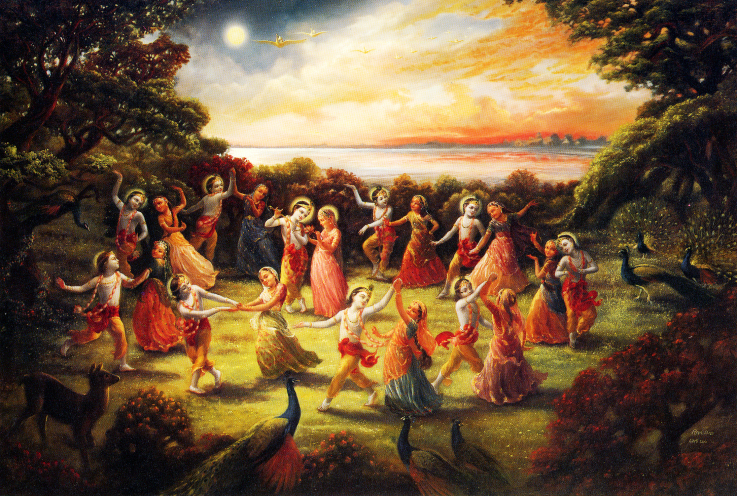Question: In Bg. 3.22 purport, Srila Prabhupada writes “Although He (Lord Krishna) is above all the regulations of the revealed scriptures, He does not do anything that violates the revealed scriptures”. And similarly in Bg.3.23p: “because He descended to establish the principles of religion He followed the prescribed rules. Otherwise, common men would follow in His footsteps, because He is the greatest authority.”
Based on the above, one may deduce that the Lord wishes not to do anything which is against the “revealed scriptures” as there is a danger that “common men” would follow in His footsteps and commit wrongdoings of some sort.
Actions like lifting Govardhan Hill, killing demons, manifesting many cows and cowherd boys, etc. are obviously not going to be imitated or attempted by “common men”. However, Lord Krishna’s dealing with the gopis, having intimate relations with married women – like Srimati Radharani and other gopis (which is normally referred to as “adultery”), stealing their clothes whilst they were bathing, etc, surely these acts aren’t exactly “in line with the revealed scriptures” Even though the Lord is “above all regulations….” and is the law creator, etc – these types of act ARE easily copy-able by any common man. So if the Lord doesn’t want common men following Him if He does something “against revealed scriptures” – then why does He do such things as above even though He has the full right do so, knowing that common men can easily mis-interpret such things and act immorally?
Answer by Romapada Swami:
Krishna’s appearance or incarnation in this material world, as stated in Bg. 4.8 has three-fold purposes: punishing the atheists and establishing religious principles are two, while the third and in fact more important one is pleasing His devotees. Whereas the other two purposes can be accomplished through other means besides His personal appearance also,
He comes to display His supra-mundane pastimes simply to attract the conditioned souls.
While manifesting His pastimes, He generally acts in such a way as to set the ideal example, but He also asserts Himself from time to time as the Original Supreme Person, not only as the All-powerful and Irreproachable but also as the enjoyer of various rasas (mellows) with His devotees. Thus He establishes His true identity, His pastimes become most relishable and attract all pious souls to draw closer to their relationship with Him. This feature of intimate loving exchanges `transcendental’ to mundane morality (not in `transgression’ of it), is the highest aspect of our relation with the Absolute Truth; without this, the secondary aspect of establishing religious principles would leave Krishna’s manifestation of His pastimes to our vision incomplete.
Stated in reverse, the highest form of morality is that which leads to Krishna’s satisfaction. His internal satisfaction, even beyond His leading sinful souls to the path of righteousness, is reciprocating with the selfless love of His unalloyed devotees. Topmost amongst those selfless lovers are the gopis.
You pointed out that Krishna certainly has the right or privilege of doing as He likes, without restriction; moreover, His passtimes exhibit this higher code of ethic. In this realm of loving exchange, worldly morality does not apply.
Of course unscrupulous persons could and in fact are likely to misunderstand and abuse such precedence; hence the need to strictly follow authorized and bona-fide acharyas. Knowing this tendency of conditioned souls, it is therefore forbidden to hear Krishna katha, and specifically these confidential pastimes, from unqualified persons or cheaply discuss them in public gatherings. A bona fide speaker or reader of Bhagavatam would never “jump to the Tenth Canto”, Srila Prabhupada would often say, without firmly establishing the fundamental principles in the preceding 9 Cantos. Sukadeva Gosvami and King Pariksit themselves set this example.
When there are bona-fide discussions on the intimate passtimes of Krishna with the gopis, ample warning is repeatedly given both within the scriptures as well as by the saintly persons who speak them, to not take them cheaply and to not “copy”, i.e. to not imitate the extra-ordinary activities either of Krishna or of great personalities, such as Lord Shiva’s drinking an ocean of poison. If in spite of such warnings one misunderstands, it is unfortunate.
We are to follow in the footsteps of great souls, which means to abide by their *teachings* (e.g. Krishna’s words in Bg) and in the process of doing so we can make unimpeded progress on the spiritual path.
One additional point should also be mentioned: those of us who are fortunate recipients of the proper knowledge also have the important responsibility to help disseminate it, for when there is proper education on these matters, there is little scope for the unscrupulous to mislead or exploit ignorant masses.







